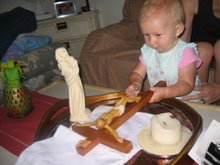Our Life and Current Affairs Commentary
The following thoughts bounce back and forth between our life and current affairs. A bit of hybrid reflection today. Memorial Day weekend has become a type of gay weekend. As a family we had a busy weekend. We spent much of our time in the city of Honolulu. While Honolulu isn't a particularly large city, it's still a city. It has a gay community and attracts tourists of every stripe. I had read a few articles online how the Memorial Day weekend was turning into a gay pride and get-together weekend. Sure enough, we witnessed many couples over the long weekend. I am curious why homosexuals chose to associate themselves with Memorial Day weekend. I don't know the answer but suspect it's just a great time to get away for a vacation and perhaps there is some push for the military to accept the gays.Most of my life I have been in the majority. I am white male. Catholic. Blondish hair, green-blue eyes. Tall. Nothing special. I have blended very well in the US and in Italy. I stuck out a little bit while living in Mexico and quite a bit while living in China. So, to say the least, I have had very little experience being a minority. I can understand how minorities enjoy being with others like themselves. Expatriates typically enjoy hanging out with other expatriates. They can relate. They have a lot in common: language, nostalgia for the motherland, experiences, antipathy and discrimination, etc. Such behavior is evident among most minorities throughout the world. Many governments take it upon themselves to do away with such undesired segregation. This self-imposed segregation is universal and natural. People enjoy being with others who are similar to themselves. We can't help it! That's why in many old cities, there is the Italian section, the German section, the Jewish section, the gay section, the black section, etc. Minority groups, and just groups in general, tend to come together. I opine that demanding society to mix is abhorrent to nature. Combating discrimination is one thing; forcing society to live in fixed ratios, in the private and public sphere, is a waste of time and, ultimately, counterproductive.
Since the homosexual community is a minority group, I can understand their desire of togetherness. I still don't understand homosexuals' use of pride and celebration. Pride is defined as "a high or inordinate opinion of one's own dignity, importance, merit, or superiority." Celebration can be defined as "a joyful diversion" or as "the performance of rituals" or as "a display." I suppose one can celebrate their cultural heritage. Irish Pride (St. Patrick's Day) or German Pride (Oktoberfest) are ways to celebrate one's roots. Yet, in today's multicultural America, it's hard to celebrate anything because it appears to infringe upon and offend everyone else. In a world of cultural relativism (multiculturalism), where cultures coexist merely on the horizontal plane and not the vertical, it's a sin for any one culture to trump over another. (I don't espouse such multiculturalism. I am arguing here only as the devil's advocate.) So, there are definitely ethnic/national pride and celebrations. There is reason to display such a culture to appreciate history, provided one attaches importance to history. In a sense, then, cultural celebrations are historical celebrations. Such celebrations commemorate important historical moments: national independence, births and deaths of famous individuals, economic landmarks, war and peace. These are meaningful events to remember, events that shape society around us. Celebrations and commemorative days have become as superfluous as the rubber, multicolored awareness bracelets. There are too many to be aware of! When I stop to think about it I realize that it's possible to celebrate everything and anything. Where does one stop? Someone ought to draw the line and have good reasons for the decision. I don't believe that we should be celebrating the achievements of minority groups without presenting the opposite side of the coin, the majority group. It might seem blase, but I feel that the majority can very easily become the down-trodden segment of society. As it is, our legal system and political system champion minority groups and rarely grant standing to majority causes. As a male, I feel sidelined by radical feminist celebrations. As a Caucasian, I feel sidelined by other cultural and national celebrations. As a heterosexual, I feel sidelined by homosexual celebrations. Should I feel pride in being a male? Should I feel pride in being white? Should I feel pride in being heterosexual? I am proud of my achievements. I am proud of who I have become through my work. It's hard for me to feel pride in simply being something by default.
I hope that this post poses this just question: What should we celebrate? What should we be proud of? Criticize a majority and join the mainstream of self-righteous. Criticize a minority and get ready to appropriate a slew of labels to describe your pathos. Is that right?
We live in a hyper-sensitive world where anyone can be offended by anyone or anything. Your offense is validated, however, only if you are in the minority. A majority victim: what's that? I doubt you will find that concept in a dictionary or in the world around us. I suppose I will have to validate myself and hope that God does so, too.
Quick Thoughts on Today's Gospel

Readings Today -- [W]hoever wishes to be great among you will be your servant.
Christ meant what he said and understood the difficulty of asking such service of us. This a tough proviso. Service equals greatness, humility is leadership. We don't hear this type of message much outside the Gospels. Part of me wants to say: Well, Lord, I don't really want greatness that much. I am not so ambitious as to desire a first spot among your followers. Yet, this is not a worldly, materialistic greatness. Christ is referring to a spiritual greatness to which we are all called. Christ calls everyone of us to a life of service, to the life of slave. The Lord's own example strengthens his mandate. He calls us to serve only once he has used his own life as a paradigm of service to others.









